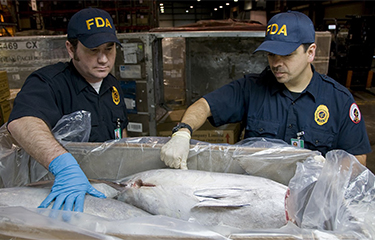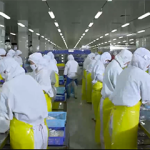FDA, CBP stepping up enforcement of labor rules on imports

A ramp-up on enforcement of rules designed to prevent forced labor by the U.S. Customs and Border Protection (CBP) and the U.S. Food and Drug Administration is expected to continue, according to an expert in U.S. import rules.
Speaking during a Seafood Expo North America Reconnect panel, FDAImports.com CEO and Founder Benjamin England that a current increase in enforcement will only increase in the coming years. With the U.S. Department of Labor including Taiwan on its list of goods produced by child labor or forced labor, CBP has begun to take action against Taiwanese trawlers and other vessels, effectively banning all imports from offending companies.
“Customs has begun to operate with some muscle,” England said.
The CBP has adopted International Labor Organization Convention 188 standards, which includes 11 indicators of forced labor in its investigations of businesses and vessels. A key part of those standards is that the investigation only needs to reasonably identify evidence to be able to put a halt on imports via a detention order, , England said.
“That means that nothing comes into the country from that supplier or that supply chain – and I mean nothing,” England said. “We practice food and drug and customs law [and] it’s one thing for us to deal with a detention order from the FDA or even from CBP with respect to a particular shipment. It’s another thing when FDA says ... that an entire manufacturing supply chain indicates that there is forced labor. The effect of that is a ban. The goods simply don’t come in.”
England said the industry is seeing more instances of this happening recently, resulting in containers from the offending companies being detained at the border and sent back, or sent to another location in rare cases.
Previously, there was an exception known as “consumptive demand,” meaning that if it was provable that there was urgent demand for the product in question, the goods could be let into the country. However, in 2016, that exception was removed and England said it no longer matters what the product is if there’s evidence of potential forced labor in the supply chain.
As an example of the harsher enforcement, England discussed the case of a shipment of latex and nitrile gloves that was turned down via a WRO in the early days of the COVID-19 pandemic, despite the desperate need for personal protective equipment in the U.S.
“They were liquid gold - they practically are still liquid gold in the U.S. market - and yet there are major suppliers that are on WRO even during the pandemic,” England said.
England said there’s little expectation that enforcement against forced labor will decrease under the Biden administration.
“It’s bipartisan in terms of appeal [and] we expect the Biden administration to maintain this priority. I don’t expect that to release at all under the Biden administration," he said.
In 2016, just four withhold release orders (WROs) were issued on goods. In 2019, seven WROs were issued, and in 2020, 15 WROs were issued. Continuing the trend, England predicted more WROs will be handed out in 2021.
“In 2021, I expect this is going to continue, and it’s going to continue in the seafood space,” England said.
Typically, a WRO is issued following an investigation of a company that results in a reasonable suspicion of forced labor.
“As soon as they identify any sign of forced labor, the supply chain is shut down,” England said. “There’s no advanced warning, there’s no notice, there’s no warning letter.”
A WRO on forced labor goods isn’t just a restriction of goods, either – there’s also potential civil, and even criminal, penalties.
“Not only do you have the risk of having your cargo being held, but if you have imported cargo made with forced labor, customs can go back and issue a penalty for that,” England said.
So far, the WROs have mainly been issued against vessels, but there’s no limit to which part of the supply chain customs targets, including processing facilities.
“Even though customs has primarily focused on vessels, my expectation is that they will go towards the processing facilities themselves,” England said. “Enforcement is clearly on the government’s mind.”
The best way to avoid potential issues is for companies to get very familiar with their supply chains and do adequate due diligence on their suppliers.
“It’s something that any importer can find themselves in the middle of without knowing it. Customs is not going to give you notice, when it happens, it happens,” he said. “The way to keep yourself out of this problem is to have a system in place to detect and disrupt forced labor in the supply chain.”
Photo courtesy of the Food and Drug Administration






Share